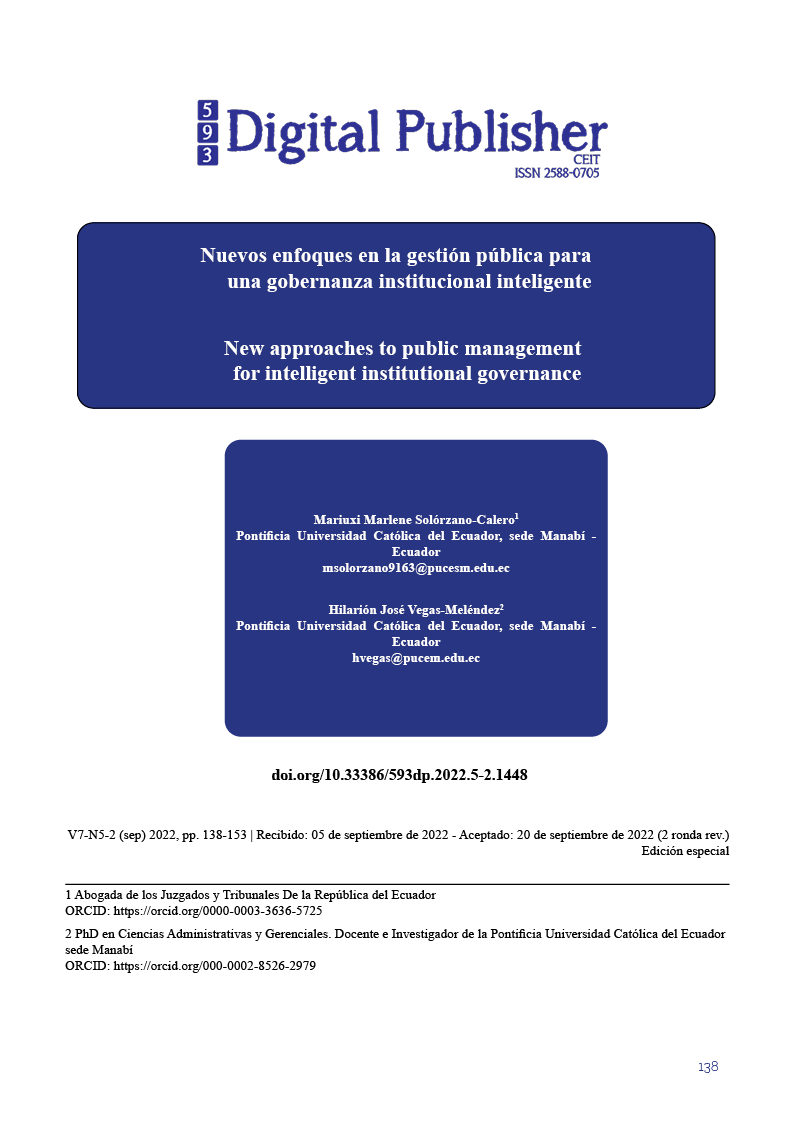New approaches in public management for smart institutional governance
Main Article Content
Abstract
The purpose of the research has been to interpret the new approaches in public management for an intelligent institutional governance, having as a unit of study the Ministry of Production, Foreign Trade, Investment and Fisheries (Ecuador); the design of the research is interpretive phenomenological type with a qualitative approach, of inductive dimension, with a level of descriptive depth, being in turn of non-experimental field, the documentary review is proposed as a strategy for obtaining theoretical postulates, reports and stories narrated by key informants; in turn, the analysis strategy was based on the phases proposed by the Grounded Theory, in which the substantive codes, axial codes, substantive concepts are represented until reaching the central category; as well as the use of hermeneutic praxis (analytical-interpretative) in order to give interpretative form to the discourse expressed by the interviewees -academic experts and researchers- through an in-depth interview (semi-structured). Among the findings found is the category Public Management 4.0: Intelligent Institutional Governance, which is presented as a proposal for good public management praxis, which arose from the triangulation between the theory consulted, the discursive narrative of the key informants and the criteria of the researchers, giving space to symbolic interactionism. Among the main reflections is the need to incorporate institutional governance in public management as a practice of direct and committed citizen participation.
Downloads
Article Details

This work is licensed under a Creative Commons Attribution-NonCommercial-ShareAlike 4.0 International License.
1. Derechos de autor
Las obras que se publican en 593 Digital Publisher CEIT están sujetas a los siguientes términos:
1.1. 593 Digital Publisher CEIT, conserva los derechos patrimoniales (copyright) de las obras publicadas, favorece y permite la reutilización de las mismas bajo la licencia Licencia Creative Commons 4.0 de Reconocimiento-NoComercial-CompartirIgual 4.0, por lo cual se pueden copiar, usar, difundir, transmitir y exponer públicamente, siempre que:
1.1.a. Se cite la autoría y fuente original de su publicación (revista, editorial, URL).
1.1.b. No se usen para fines comerciales u onerosos.
1.1.c. Se mencione la existencia y especificaciones de esta licencia de uso.
References
Adler P., y Adler P. (2002). Observational teclmiques. Ed. Norman. Lincoln (comps), Collecting and inte1jJreting qualitati-oe materials. http://www.derechoshumanos.unlp.edu.ar/assets/files/documentos/como-hacer-investigacion-cualitativa.pdf
Álvarez-Gayou J. (2003). Cómo hacer investigación cualitativa: Fundamentos y Metodología. Editorial. Paidós.
Barzelay, Michael (2003). La Nueva Gestión Pública. Fondo de Cultura Económica,
Primera Edición en español. México.
CLAD (2020). Carta Iberoamericana de Innovación en la Gestión Pública. Documentos del CLAD: Consensos y Declaraciones. https://clad.org/wp-content/uploads/2020/10/Carta-Iberoamericana-de-Innovacion-10-2020.pdf
CLAD (2016). Carta Iberoamericana de Gobierno Abierto. Documentos del CLAD: Consensos y Declaraciones. https://clad.org/wp-content/uploads/2020/07/Carta-Iberoamericana-de-Gobierno-Abierto-07-2016.pdf
CLAD (2010). Gestión pública Iberoamericana: Documentos del CLAD: Consensos y Declaraciones. https://clad.org/wp-content/uploads/2020/07/Gestion-Publica-Iberoamericana-para-el-siglo-XXI.pdf
CLAD (2008). Carta Iberoamericana de Calidad en la Gestión Pública. Documentos del CLAD: Consensos y Declaraciones. https://clad.org/wp-content/uploads/2020/07/Carta-Iberoamericana-de-Calidad-en-la-Gestion-Publica-06-2008.pdf
Constitución de la República del Ecuador (2008). Decreto Legislativo 0 Registro Oficial 449 de 20-oct-2008 Ultima modificación: 13-jul-2011 Estado: Vigente. https://www.oas.org/juridico/pdfs/mesicic4_ecu_const.pdf
Cornelissen J. (2006). Dar sentido a la construcción de teorías: metáfora e imaginación disciplinada. Revista Estudio de Organización. https://www.researchgate.net/publication/33038739_Making_Sense_of_Theory_Construction_Metaphor_and_Disciplined_Imagination
Correa A. A (2020). Nuevos enfoques en la gestión pública para una gobernanza institucional inteligente. Manabí. Entrevista en profundidad.
Crozier Michael (1997). La transición del paradigma burocrático a una cultura de gestión pública. Revista del CLAD, No. 7.
Drucker, P. (1992). Management. Edit. Harper & Row.
Gadamer H. G. (2001). Fundamentos de la Hermenéutica. Siglo XX Editores.
Habermas, J. (1981) Theorie des kommunikativen Handelns. Kritik der funktionalistischen Vernunft.
Hernández-Sampieri R. (2017). Metodología de la Investigación. 7ma. Edición. https://www.uca.ac.cr/wp-content/uploads/2017/10/Investigacion.pdf
Jaramillo, C. (1994). La gerencia social: una alternativa para el sector social. La gerencia social y el Nuevo Paradigma de Gerencia. Revista Universidad EAFIT (96):65-77.
Kliksberg, B. (1994), Pobreza: un tema impostergable. Nuevas respuestas a nivel mundial.
Lincoln, Y. y Guba (1985). Naturalistic Inquiry.
Organización para la Cooperación y el Desarrollo Económicos (2014). Estudios de la OCDE sobre Gobernanza Pública. Reforma administrativa a la mejora continua. https://www.oecd.org/gov/PGR%20SPain%20Resumen%20Ejecutivo.pdf
O’Donnell, Guillermo (1998), “Accountability Horizontal”, Agora. Cuaderno de Estudios Políticos, 8(4):5-34.
Osborne, David y Gaebler, Ted (1994). La Reinvención del Gobierno. La influencia
del espíritu empresarial en el sector público. Editorial Paidos.
Oszlak, O. (2013), Gobierno abierto: hacia un nuevo paradigma de gestión pública. Red REALC/OEA/BID. https://www.oas.org/es/sap/dgpe/pub/coleccion5RG.pdf
Pérez P. W. (2020). Nuevos enfoques en la gestión pública para una gobernanza institucional inteligente. Manabí. Entrevista en profundidad.
Peters, T. & Waterman, R. (1982). In Search of Excellence. Lessons from American´s Best Running Companies. Edi. Harper & Row
Puentes S. V. (2020). Nuevos enfoques en la gestión pública para una gobernanza institucional inteligente. Manabí. Entrevista en profundidad.
Plan Nacional de Desarrollo (PND, 2021). Plan de Creación de Oportunidades. Gobierno del Ecuador. https://observatorioplanificacion.cepal.org/es/planes/plan-de-creacion-de-oportunidades-2021-2025-de-ecuador
Programa de la Naciones Unidas para el Desarrollo (PNUD, 2007). La democracia de ciudadanía: Una agenda para la construcción de ciudadanía en América Latina. https://controlatugobierno.com/bibliografia/la-democracia-de-ciudadania-una-agenda-para-la-construccion-de-ciudadania-en-america-latina-pnud/
Strauss A, y Corbin J. (2012). Bases de la investigación cualitativa. Técnicas y procedimientos para desarrollar la teoría fundamentada. Ed. Universidad de Antioquia. En línea: https://diversidadlocal.files.wordpress.com/2012/09/bases-investigacion-cualitativa.pdf
Taylor S.J. y Bodgan R. (1998). Introducción a los métodos cualitativos de investigación. Editorial Paidos.
Toffler, A. (1993). El Shock del Futuro. Barcelona : Plaza & Janes.
Vegas H. (2015). Gestión pública local, gobernanza y participación: una visión a partir del discurso de los actores sociales en Venezuela. Tesis Doctoral. http://mriuc.bc.uc.edu.ve/bitstream/handle/123456789/2119/hvegas.pdf?sequence=1
Weber, M. (1992). Economía y Sociedad Tomo II. Fondo de Cultura Económica.
Weick, K. (2001). Making Sense of the Organization. Edi. Blackwell Publishing.



